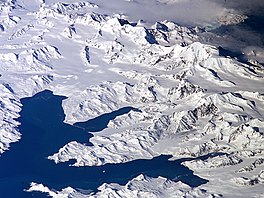New article |
Original name was De Geer Glacier |
||
| Line 12: | Line 12: | ||
}} |
}} |
||
'''Harker Glacier''' is a tidewater [[glacier]] on [[South Georgia and the South Sandwich Islands|South Georgia Island]] in the southern [[Atlantic Ocean]]. The glacier |
'''Harker Glacier''' is a tidewater [[glacier]] on [[South Georgia and the South Sandwich Islands|South Georgia Island]] in the southern [[Atlantic Ocean]]. The glacier first mapped by the [[Swedish Antarctic Expedition]] (1901-1904), and named '''De Geer Glacier''', after [[Gerard De Geer]] (1858-1943), a [[Sweden|Swedish]] [[geologist]] who specialized in [[geomorphology]] and [[geochronology]]. It was remapped in 1912 by [[David Ferguson]], and renamed for [[Alfred Harker (petrologist)|Alfred Harker]] (1859-1939), an [[England|English]] geologist who specialised in [[petrology]] and [[petrography]].<ref name="usgs">United States Geological Survey (2002). [http://geonames.usgs.gov/pls/gnisarchive/webant.antquery?fname=Harker&variant=no&ftype=&elev1=&elev2=&descr=&ndeg=&nmin=&wdeg=&wmin=&wdir=W&edeg=&emin=&edir=W&sdeg=&smin=&tab=y "Feature Name: Harker"]. [[United States Geological Survey]], [[United States Department of the Interior]]. Retrieved May 10, 2007.</ref> |
||
The valley in which Harker Glacier is located drains from south to north out of the [[Allardyce Range]] into [[Moraine Fjord]] in the eastern side of [[Cumberland Bay]], south of [[Grytviken]], the principal settlement of the island. Harker Glacier is a tidewater glacier that contributes [[iceberg]]s to the bay. The glacier has not changed significantly since the 1970s, but is further advanced than when it was photographed by [[Frank Hurley]] in 1914.<ref name="rsgs">[http://web.ges.gla.ac.uk/Expeditions/Scotia/first_report.pdf "''Scotia'' Centenary Antarctic Expedition (2002-2003)"]. Royal Scottish Geographical Society, Glasgow, United Kingdom, pp. 5-6.</ref> |
|||
| ⚫ | |||
| ⚫ | |||
| ⚫ | |||
| ⚫ | |||
==See also== |
==See also== |
||
| Line 26: | Line 23: | ||
* [http://www.flickr.com/photos/abar/376769785/ Photo of Harker Glacier], moraine visible. |
* [http://www.flickr.com/photos/abar/376769785/ Photo of Harker Glacier], moraine visible. |
||
* [http://earthweb.ess.washington.edu/lnk/epic/Collections/Evans/pages/EP_0013_DAE_GL.htm Photo of the calving terminus] of Harker Glacier. |
* [http://earthweb.ess.washington.edu/lnk/epic/Collections/Evans/pages/EP_0013_DAE_GL.htm Photo of the calving terminus] of Harker Glacier. |
||
| ⚫ | |||
| ⚫ | |||
| ⚫ | |||
| ⚫ | |||
| Line 31: | Line 33: | ||
[[Category:South Georgia and the South Sandwich Islands]] |
[[Category:South Georgia and the South Sandwich Islands]] |
||
[[Category:Glaciers of |
[[Category:Glaciers of South Georgia]] |
||
Revision as of 00:09, 11 May 2007
 | |
| Type | Tidewater glacier |
|---|---|
| Location | South Georgia Island |
| Coordinates | 54°22′0.12″S 36°31′59.88″W / 54.3667000°S 36.5333000°W |
| Terminus | Cumberland Bay |
| Status | Stable/Advancing |
Harker Glacier is a tidewater glacier on South Georgia Island in the southern Atlantic Ocean. The glacier first mapped by the Swedish Antarctic Expedition (1901-1904), and named De Geer Glacier, after Gerard De Geer (1858-1943), a Swedish geologist who specialized in geomorphology and geochronology. It was remapped in 1912 by David Ferguson, and renamed for Alfred Harker (1859-1939), an English geologist who specialised in petrology and petrography.[1]
The valley in which Harker Glacier is located drains from south to north out of the Allardyce Range into Moraine Fjord in the eastern side of Cumberland Bay, south of Grytviken, the principal settlement of the island. Harker Glacier is a tidewater glacier that contributes icebergs to the bay. The glacier has not changed significantly since the 1970s, but is further advanced than when it was photographed by Frank Hurley in 1914.[2]
See also
External links
- British Antarctic Service Metadata Management System Gazeteer entry for Harker Glacier.
- Photo of Harker Glacier, moraine visible.
- Photo of the calving terminus of Harker Glacier.
Cited references
- ^ United States Geological Survey (2002). "Feature Name: Harker". United States Geological Survey, United States Department of the Interior. Retrieved May 10, 2007.
- ^ "Scotia Centenary Antarctic Expedition (2002-2003)". Royal Scottish Geographical Society, Glasgow, United Kingdom, pp. 5-6.